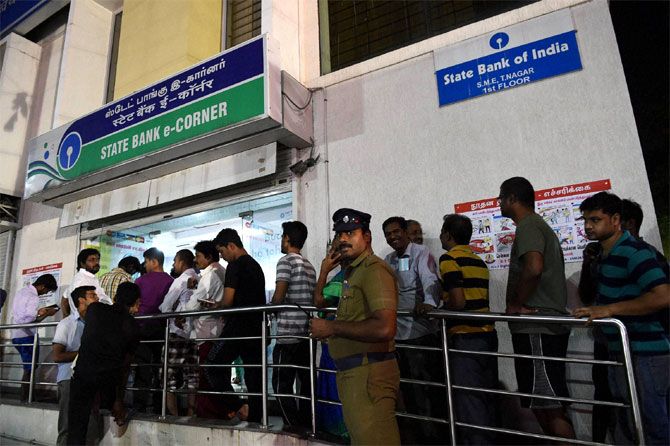The loss of income has severely dented the loan repayment ability of small borrowers, reports Abhijit Lele/Business Standard.

The asset quality problems for banks and finance companies are rising as small customers continue to struggle with the adverse effect of demonetisation.
But, it might show up only in the fourth quarter numbers, as the Reserve Bank of India (RBI) has given an additional 60 days for lenders to classify accounts as non-performing.
According to public sector bank executives, the work pressure from managing deposits and cash withdrawal is coming down and banks have begun to assess the impact of demonetisation on the loan side – both asset quality and demand for credit.
Risks of slippages have increased and a picture will be clear at the end of the financial year. Karthik Srinivasan, senior vice-president of ICRA, said delinquencies have increased as collections have gone down.
The loss of income has severely dented the loan repayment ability of small borrowers. Also, many of those bankers who were deployed for loan recovery were put on the job of managing a sudden surge in activity at branches after demonetisation.
The combined effect will be a rise in stressed loans by at least 100 basis points, said Abhishek Bhattacharya, director and co-head (financial institutions) at India Ratings.
According to global rating agency Standard and Poor’s (S&P), many advances on banks’ watch lists could also slip due to the cash crunch and a slowdown in business.
Companies are also affected by rising working capital cycles since they have to support the supply chain, which often deals in cash. Therefore, borrowers at the margin could turn delinquent.
Abizer Diwanji, partner and national leader (financial services) at EY India, said although people will resume payments, it would happen with a lag.
It would take a couple of quarters before payment patterns normalise. Highly cash-dependent businesses, especially small and medium enterprises, will have a hard time in making payment. This will push the kitty of stressed loans.
Bank chief executives in their pre-Budget (FY18) presentation to the finance ministry said four sectors need attention.
These are: Vegetable growers who depend on cash for their day to day dealings and can’t hold their crop for long, as it is perishable; brick-kiln labourers, as their owners used to pay them in cash; the transport sector in rural India; and, plantations in the South.
An IDBI Bank executive said this quarter would see a severe impact of demonetisation on loan demand and slippages.
ICRA estimates 80-85 per cent of retail credit (of finance and housing finance companies) is in the under Rs 1-crore loan size category.
Non-banking financial companies and housing finance companies operate largely in the self-employed borrower segment, which conducts business mostly through cash transactions and thus is considerably affected by the withdrawal of Rs 500 and Rs 1,000 notes.
The fallout of demonetisation will be a drop in credit growth. Advances for the banking system are expected to grow at 10-11 per cent in FY17. Now, credit may expand at a slower pace of 5-6 per cent, Bhattacharya said.
Credit offtake has already slowed drastically in the current financial year compared to FY16. Banks disbursed Rs 89,500 crore from April to early December - down from Rs 4,03,220 crore in the same period in 2015-16, according to RBI data.
Photograph: PTI Photo











